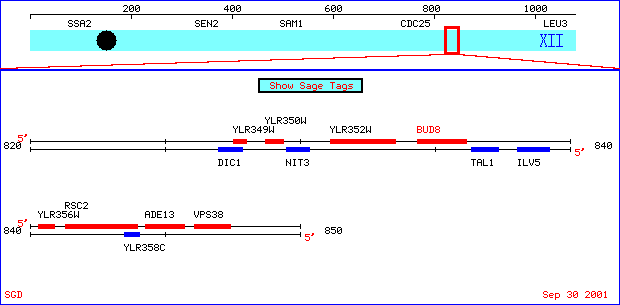
This web page was produced as an assignment for an undergraduate course at Davidson College.
NON-ANNOTATED YEAST GENE: YLR352W
No known molecular function or biological process.
Locus: YSCL9638
Chromosome XII
15175 bp
GenBank accession number: U19102.1
Description: Hypothetical ORF
Phenotype: Systematic deletion viable
http://genome-www4.stanford.edu/cgi-bin/SGD/locus.pl?locus=YLR352W

Figure1. Features around YLR352W on chromosome XII. Spanning a region 10 kb
left and 10 kb right
(coordinates 824351 to 846162). Light blue bar
represents the chromosome you are viewing. Red bars
are Watson strand ORFs and blue bars are Crick
strand ORFs. Notice the location next to BUD8. Permission requested from
http://genome-www4.stanford.edu/cgi-binfrom/SGD/ORFMAP/ORFmap?sgdid=S0004345

Figure 2. Kyte Doolittle hydropathy plot. http://fasta.bioch.virginia.edu/fasta/cgi/pgrease.cgi
The YLR352W gene does not appear to have potential for a transmembrane domain because the graph does not show a peak near or above 2. (Fig.2)
At the PREDATOR site (http://npsa-pbil.ibcp.fr/cgi-bin/secpred_preda.pl a secondary structure prediction can be made. With the known protein sequence, at the site predicted 23.92% alpha helices, 13.63% extended strands, and 62.45% random coils.No hits were found for the protein on the Conserved Domain Database http://www.ncbi.nlm.nih.gov/Structure/cdd/wrpsb.cgi.
Because the gene is located near proteins involved in bipolar budding, a good prediction would be that the YLR352W gene may also be involved in this process.
REFERENCES
http://genome-www4.stanford.edu/cgi-bin/SGD/locus.pl?locus=YLR352W, accessed September 30, 2001.
http://genome-www4.stanford.edu/cgi-binfrom/SGD/ORFMAP/ORFmap?sgdid=S0004345, accesses September 30, 2001.
http://fasta.bioch.virginia.edu/fasta/cgi/pgrease.cgi, accessed September 30, 2001.
http://npsa-pbil.ibcp.fr/cgi-bin/secpred_preda.pl, accessed September 30, 2001.
http://www.ncbi.nlm.nih.gov/Structure/cdd/wrpsb.cgi., accessed September 30, 2001.
Contact me at mrwilson@davidson.edu